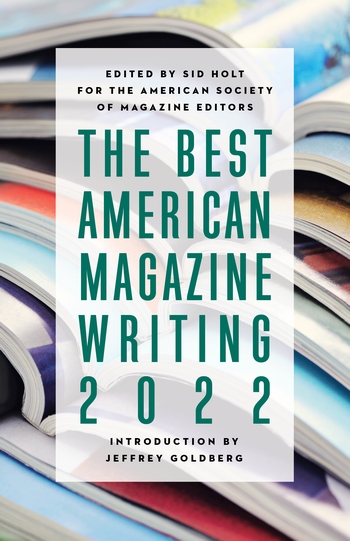- Home
- About
- Membership
- News and Events
- ASME NEXT
- ASME Awards
- Job Board
Edited by Sid Holt for the American Society of Magazine Editors
Introduction by Jeffrey Goldberg, editor in chief of The Atlantic
Columbia University Press

The Best American Magazine Writing 2022 presents a range of outstanding writing on timely topics, from in-depth reporting to incisive criticism: Kristin Canning calls for a change in how we talk about abortion (Women’s Health), and Ed Yong warns us about the next pandemic (The Atlantic). Matthieu Aikins provides a gripping eyewitness account of the Taliban’s seizure of Kabul (New York Times Magazine). Heidi Blake and Katie J. M. Baker’s “Beyond Britney” examines how people placed under legal guardianship are deprived of their autonomy (BuzzFeed News). Rachel Aviv profiles a psychologist who studies the fallibility of memory—and has testified for defendants including Harvey Weinstein and Bill Cosby (The New Yorker).
The anthology includes dispatches from the frontiers of science, exploring why Venus turned out so hellishly unlike Earth (Popular Science) and detailing the potential of NASA’s James Webb Space Telescope (Quanta). It features celebrated writers, including Harper’s magazine pieces by Ann Patchett, whose “These Precious Days” is a powerful story of friendship during the pandemic, and Vivian Gornick, who offers “notes on humiliation.” Carina del Valle Schorske depicts the power of public dance after pandemic isolation (New York Times Magazine). And the NBA icon Kareem Abdul-Jabbar lauds the Black athletes who fought for social justice (AARP the Magazine). Amid the continuing reckoning with racism, authors reconsider tarnished figures. The Black ornithologist and birder J. Drew Lanham assesses the legacy of John James Audubon in the magazine that bears his name, and Jeremy Atherton Lin questions his youthful enthusiasm for Morrissey (Yale Review). Jennifer Senior writes about memory and the lingering grief felt for a friend killed on 9/11 (The Atlantic). The collection concludes with Nishanth Injam’s story of queer first love across religious boundaries, “Come with Me” (Georgia Review).
